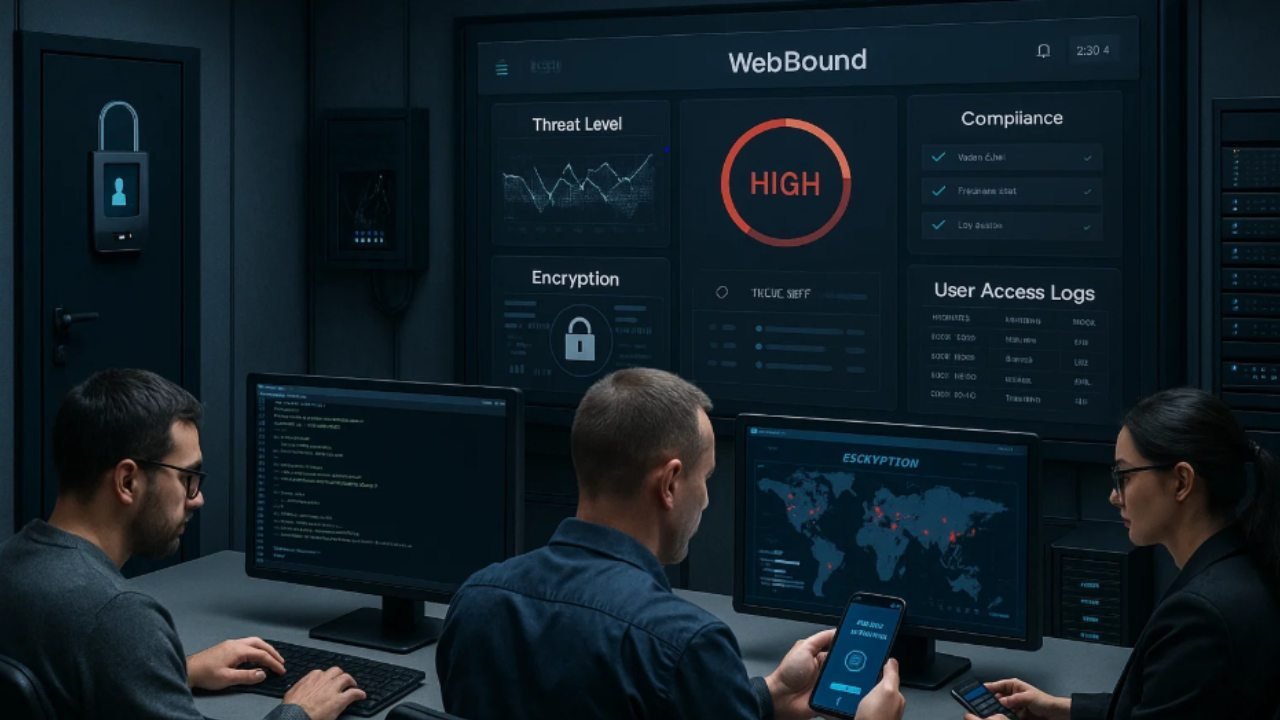Wepbound is a revolutionary security framework designed to build secure, adaptive web applications that meet the demands of modern digital ecosystems. It transforms web security from a reactive afterthought into a proactive, continuous process, ensuring professional escorts, relaxation services, and nightlife entertainment providers can offer safe, discreet, and reliable digital experiences.
Wepbound’s approach includes foundational security principles, strategic threat assessment techniques, identity and access management best practices, data protection strategies, and building a security-aware development culture. As industries increasingly rely on digital solutions, the stakes for security have never been higher.
Table of Contents
What Is Wepbound?
Wepbound is a holistic security framework designed for adaptive, secure web applications, particularly in industries where privacy and discretion are paramount.
Wepbound integrates technical controls with operational best practices, making it ideal for companion agencies, adult entertainment, and professional escort services.
The Four Foundational Pillars of Wepbound
The Wepbound approach is built on four foundational pillars, each supporting secure and resilient web applications.
The Pillars Explained
| Pillar | Description |
| Proactive Defense | Anticipate and neutralize threats before they materialize |
| Adaptive Response | Quickly adjust to new risks and vulnerabilities |
| User-Centric Privacy | Prioritize client confidentiality and data protection |
| Continuous Improvement | Evolve security practices based on feedback and emerging threats |
Table: The Four Pillars of Webbound Security
Foundational Security Principles: From Reactive to Proactive Protection
The digital landscape is shifting from a feature-first mindset to a security-first culture. For businesses offering escort services or managing personal companionship bookings, this shift is critical to protect sensitive client data and maintain trust.
Embracing the Wepbound Security Mindset
Wepbound encourages developers and organizations to embed security into every stage of the development lifecycle. Instead of patching vulnerabilities after deployment, Wepbound promotes continuous validation and adaptive security architectures that anticipate threats.
Breaking down traditional silos between development, operations, and security teams fosters distributed ownership of security responsibilities, ensuring that everyone contributes to building resilient applications.
| Traditional Security Approach | Wepbound Security Approach |
| End-of-cycle testing | Continuous validation |
| Reactive patches | Proactive threat modelling |
| Siloed responsibilities | Distributed ownership |
| Static configurations | Adaptive responses |
Table: Traditional vs. Webbound Security Approaches
This table highlights how Wepbound transforms security from a reactive, fragmented process into a proactive, collaborative, and adaptive discipline that aligns perfectly with the needs of industries requiring discretion and reliability.
Strategic Threat Assessment: Building Bulletproof Defence Systems

Before writing a single line of code, understanding the threat landscape is fundamental. Escort services and adult entertainment platforms handle highly sensitive data, making them prime targets for cyberattacks.
Building a Threat Model Before Development
Wepbound advocates for comprehensive threat modelling that identifies valuable assets, such as client profiles, booking details, and payment information and maps potential attack vectors. This process prioritizes security controls based on risk, ensuring resources focus on the most critical vulnerabilities.
Asset Classification and Protection
Classifying assets helps determine their sensitivity and the level of protection required. For example:
- Personal companionship data: Requires encryption and strict access controls.
- Payment information: Must comply with PCI DSS standards.
- Booking schedules: Need protection against unauthorized access to maintain discretion.
Modern Attack Vector Identification
Cyber threats evolve rapidly. Common attack vectors include:
- Phishing and social engineering targeting client or staff credentials.
- Injection attacks exploiting insecure code.
- Distributed Denial of Service (DDoS) attacks disrupting service availability.
Security Risk Assessment Matrix
| Threat Likelihood | Impact Severity | Priority Level | Recommended Controls |
| High | High | Critical | Multi-factor authentication, encryption, continuous monitoring |
| Medium | High | High | Role-based access control, regular audits |
| High | Medium | High | Input validation, secure coding practices |
| Low | High | Medium | Backup and recovery plans |
Chart: Security Risk Assessment Matrix
This matrix guides escort services and nightlife entertainment platforms in allocating security resources effectively, balancing risk likelihood and impact.
Identity and Access Management: Securing the Digital Gateway
Authentication and authorisation are the first lines of defence in protecting sensitive user data and ensuring only authorized personnel access confidential information.
Modern Authentication Protocols
Wepbound supports next-generation protocols such as OAuth 2.0, WebAuthn, and FIDO2, which enhance security while improving user experience. These protocols enable passwordless authentication and strong multi-factor authentication (MFA), critical for maintaining client confidentiality in discreet arrangements.
Role-Based Access Control (RBAC)
RBAC ensures that users only have access to the information necessary for their role. For example, a professional escort might access their schedule and client preferences but not payment processing systems.
Zero Trust Architecture
Zero trust is a fundamental shift in digital security, assuming that no user or device is inherently trustworthy. Every access request undergoes strict verification, thereby minimising risks from insider threats or compromised credentials.
“Zero trust isn’t just a security model—it’s a fundamental shift in how we think about digital trust in 2025.” – CISA Security Framework Guidelines
Data Protection Throughout the Application Journey
From the moment a client initiates a Friday night plan to post-service feedback, data security must be unwavering.
End-to-End Data Protection
Wepbound enforces encryption of data both in transit and at rest, safeguarding sensitive information such as client identities, booking details, and payment data.
Privacy-by-Design
Building privacy into the application architecture from the start ensures compliance with regulations such as GDPR and regional data protection laws. Escort services and companion agencies benefit from transparent data handling policies that foster client trust.
Secure Coding Practices
Secure coding practices are essential for building trustworthy web applications, particularly in sensitive industries such as escort services, companion agencies, and adult entertainment. Protecting client data and ensuring discreet, seamless interactions require minimising vulnerabilities that attackers could exploit.
Key practices include input validation and sanitisation, which prevent attacks such as SQL injection and cross-site scripting (XSS) by ensuring all user inputs conform to expected formats and are cleansed of harmful characters. Always validate inputs on the server side and use allow lists rather than block lists.
Using parameterized queries separates code from data, effectively blocking SQL injection attempts, crucial for protecting booking and payment systems. Implementing strong authentication and authorization methods like multi-factor authentication (MFA) and role-based access control (RBAC) restricts access to sensitive client information.
Encrypting sensitive data both in transit and at rest with strong algorithms safeguards personal companionship and payment details. Output encoding prevents XSS attacks by safely encoding data sent to clients, maintaining platform integrity.
Regular code reviews and automated testing help detect vulnerabilities early, while secure dependency management ensures third-party libraries don’t introduce risks. Lastly, secure session management using HTTP-only cookies and proper session handling prevents hijacking and unauthorized access.
Together, these practices form a robust defence, protecting sensitive information and ensuring privacy and reliability for escort and adult entertainment platforms.
Table: Key Secure Coding Practices and Their Benefits
| Practice | Benefit |
| Input Validation & Sanitization | Prevents injection and malicious data |
| Parameterized Queries | Blocks SQL injection |
| Strong Authentication | Restricts access to authorized users |
| Encryption | Protects client privacy |
| Output Encoding | Prevents XSS attacks |
| Code Reviews & Testing | Early vulnerability detection |
| Dependency Management | Reduces third-party risks |
| Secure Session Management | Prevents session hijacking |
Development Excellence: Building Security into Every Line of Code
Secure coding is the foundation of any trustworthy web application, especially in sectors where discretion and privacy are paramount.
Scalable Secure Coding Standards
Wepbound promotes standards that validate all user inputs, sanitize outputs, and use parameterized queries to prevent injection attacks. These practices protect against common vulnerabilities that could expose client data.
Automated Security Testing
Integrating automated security tests into Continuous Integration/Continuous Deployment (CI/CD) pipelines helps identify vulnerabilities early, reducing the risk of breaches in production.
Managing Dependencies and Supply Chain Security
Third-party libraries and dependencies must be carefully vetted and regularly updated to avoid introducing vulnerabilities.
Organizational Security Culture: Making Security Everyone’s Responsibility
Security is not just technical, it’s cultural. Wepbound encourages organizations to foster a security-aware mindset across all teams.
Developer Security Training
Regular training equips developers with the latest security knowledge and practices, enabling them to write safer code and recognize emerging threats.
Incentivizing Security Best Practices
Rewarding proactive security efforts motivates teams to prioritize security without sacrificing development velocity.
Balancing Security and Development
Wepbound emphasizes accountability and ownership, ensuring security requirements are integrated seamlessly into agile workflows.
Wepbound Technology: The Future of Connected Digital Experiences
Wepbound is more than a security framework; it’s a technology platform designed to power the next generation of connected, secure digital experiences.
Understanding Wepbound’s Core Architecture
Wepbound combines seamless connectivity with enhanced security and scalability, making it ideal for industries like adult entertainment, escort services, and companion agencies that require both privacy and performance.
Industry Applications and Benefits
| Industry | Application Example | Key Benefits |
| Escort Services | Secure booking and client management | Enhanced privacy, reduced fraud risk |
| Nightlife Entertainment | Real-time event booking and access | Scalable infrastructure, seamless user experience |
| Adult Entertainment | Content delivery and subscription management | Multi-layered security, compliance with regulations |
Table: Wepbound Industry Applications and Benefits
Future Outlook
Emerging trends such as AI-driven threat detection and blockchain-based identity verification are integral to Wepbound’s roadmap, ensuring platforms remain resilient against evolving cyber threats.
“By 2025, 80% of enterprise applications will require adaptive security frameworks like Wepbound to handle dynamic threat landscapes.” – Gartner Security Research Report 2025
You must need to read: Wunonovzizpimtiz: The Breakthrough Shaping Tomorrow
Wrapping Up:
Wepbound is a user-focused approach that addresses the digital change in adult entertainment platforms, companion agencies, and escort services. It combines advanced authentication, ongoing threat analysis, and secure development techniques to safeguard private customer information and ensure reliable service provision.
By implementing Wepbound principles, businesses can navigate the intricacies of contemporary online security, protect intimate relationships, and establish trust with customers, setting the standard for safe, connected digital experiences.
FAQs:
1: What is Wepbound, and how does it differ from traditional security frameworks?
Wepbound is an adaptive security framework that emphasizes continuous validation, proactive threat modeling, and distributed ownership of security responsibilities, unlike traditional reactive and siloed approaches.
2: How does Wepbound improve security for escort services and companion agencies?
By implementing strong authentication, encryption, and zero trust principles, Wepbound protects sensitive client data and ensures discreet, secure personal companionship arrangements.
3: Can Wepbound be integrated into existing web applications?
Yes, Wepbound’s principles can be incrementally applied to enhance security without disrupting current operations, making it suitable for both new and legacy systems.
4: What are the key benefits of adopting Wepbound for nightlife entertainment platforms?
Wepbound offers scalable infrastructure, seamless connectivity, and robust security controls that protect user data and ensure uninterrupted service during peak times.
5: How does Wepbound support compliance with data privacy regulations?
Wepbound incorporates privacy-by-design, secure data processing, and compliant data retention policies aligned with GDPR and other regional laws.

